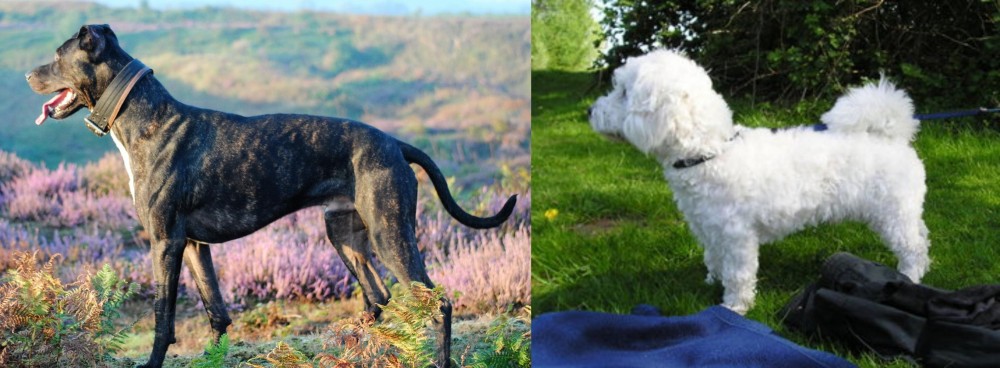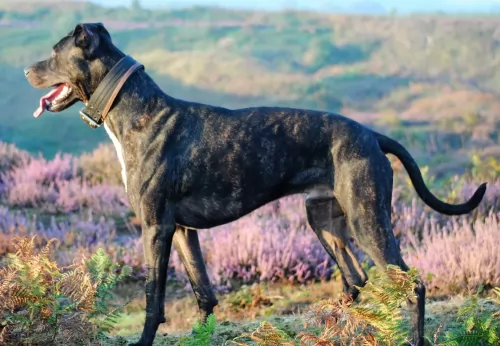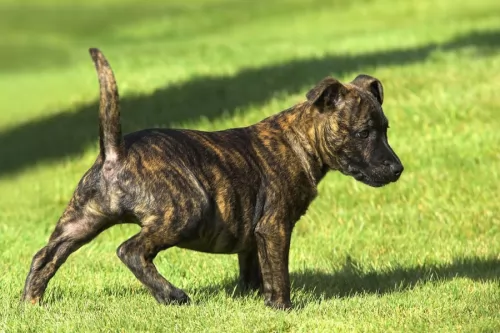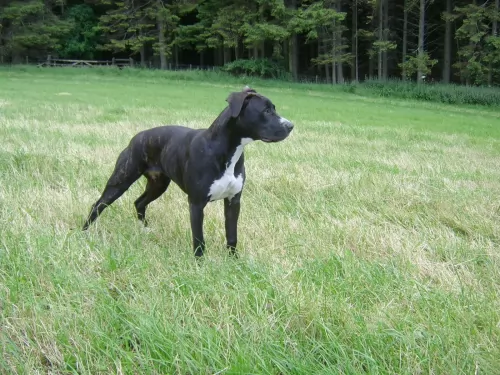 Petzlover
Petzlover Alaunt is originated from Afghanistan but Franzuskaya Bolonka is originated from France. Alaunt may grow 58 cm / 23 inches higher than Franzuskaya Bolonka. Alaunt may weigh 63 kg / 139 pounds more than Franzuskaya Bolonka. Alaunt may live 4 years less than Franzuskaya Bolonka. Alaunt may have more litter size than Franzuskaya Bolonka. Both Alaunt and Franzuskaya Bolonka requires Low Maintenance.
Alaunt is originated from Afghanistan but Franzuskaya Bolonka is originated from France. Alaunt may grow 58 cm / 23 inches higher than Franzuskaya Bolonka. Alaunt may weigh 63 kg / 139 pounds more than Franzuskaya Bolonka. Alaunt may live 4 years less than Franzuskaya Bolonka. Alaunt may have more litter size than Franzuskaya Bolonka. Both Alaunt and Franzuskaya Bolonka requires Low Maintenance.
 Alaunt is an extinct breed that existed 3000 years ago since 300 years ago. They were very popular dogs and people used them for many different tasks. They were a perfect working dog, but also they were used for wars and many other situations. Since the migrating was very common through the history, there were many different Alaunt breeds all over the Europe and Asia. Alaunt originated from central Asia, probably Afghanistan.
Alaunt is an extinct breed that existed 3000 years ago since 300 years ago. They were very popular dogs and people used them for many different tasks. They were a perfect working dog, but also they were used for wars and many other situations. Since the migrating was very common through the history, there were many different Alaunt breeds all over the Europe and Asia. Alaunt originated from central Asia, probably Afghanistan.
 The Franzuskaya Bolonka in France is known as the Tsvetnaya Bolonka in Russia and in Germany as the Bolonka Zwetna. All of these translate to Colored Bolognese. It is known as the “Pride of Russia” and was rediscovered by the Russians following the thaw of the Cold War. It is also sometimes translated as a colored lapdog.
The Franzuskaya Bolonka in France is known as the Tsvetnaya Bolonka in Russia and in Germany as the Bolonka Zwetna. All of these translate to Colored Bolognese. It is known as the “Pride of Russia” and was rediscovered by the Russians following the thaw of the Cold War. It is also sometimes translated as a colored lapdog.
The Bolonka is a rare breed in the toy category with ancestors in the Bichon Friese line. This little dog looks very much like the national dog of Cuba – the Havanese. In addition to the Bichon other small dogs in this ancestral line include the Shih Tzu, Toy Poodle, and Pekingese as well as the French, Italian and German Bolonka. They are often confused with the Bolognese as both breeds appear in various countries and have many similarities.
In all countries the common name for this dog is the Bolonka. They have a variety of names and nick names depending on the country. In addition to being the “Pride of Russia” he is called a Russian colored Bichon, Czechs call it the Bareyny Bolonsky, the Germans since 1980 have called it the Bolonka Zwetna but the Nordic Kennel Union does not recognize the Zwenta only the Russian Twetnaya.
The French version is seen to be the original with its ancestry dating back to the 18th century when Russian nobles were presented with a Bolonka by Louis XIV of France, and others migrated with the army of Napoleon to Russia. They were still known as the Bolonka of France. Small dogs were not popular in Russia due to the need for dogs that could work on farms and/or hunt. Particularly during the Soviet years, they were considered unnecessary. No Bolonkas were imported to Russia during the Soviet regime, so only localized breeding took place. The goal of breeders in the Soviet Union was to develop a toy dog, lap sized with an apartment living temperament.
During the cold war the Russians sent a pair of breeding Franzuskaya Bolonka to East Germany and they began to develop the breed there as well. At the same time the colored versions of the Bolonka were being bred. The Franzuskaya Bolonka is recognized by the Verband Dur Das Deutsche Hundewesen (VDF) while the other colored breeds are not. The white Bolonka is not recognized by the Federation Cynoloqique Internationale as a breed separate from the Bolognese but as simply another version. Individual clubs throughout the world recognized one or more versions of the Bolonka. They are thought to be the rarest within the Bichon family.
Today’s Bolonka is owed by Prince William and Princess Kate, giving the breed more publicity than it has had in many years.
 Weight of the Alaunt variates and it depended from dog to dog. The average weight of this breed was 20-68kg. While their height was 56-85cm. Females were slightly smaller with an average weight of 16-60kg, with a height of 50-80cm.
Weight of the Alaunt variates and it depended from dog to dog. The average weight of this breed was 20-68kg. While their height was 56-85cm. Females were slightly smaller with an average weight of 16-60kg, with a height of 50-80cm.
A lifespan of Alaunt was 10-12 years. Litter Size of an average Alaunt was 6-10 puppies.
Other Names for Alaunt are White Kazbegi, White Balkan dogs, Alaunt Gentil, Alaunt de Boucherie, Boucherie
 The Franzuskaya Bolonka is neither heavy boned nor fine boned. They are a toy breed with a moderate bone structure. The ears are neither long nor short and they have tails that touch the back at the tip. Like others in the Bichon family the Franzuskaya Bolonka does not shed. He is a sturdy little dog and the male has a distinct beard and moustache that the females of the breed do not. They have long coats that are wavy and curly. The Franzuskaya Bolonka is of course only white. The Russian version might be brown, red, black, wolf-gray, gray and of course white.
The Franzuskaya Bolonka is neither heavy boned nor fine boned. They are a toy breed with a moderate bone structure. The ears are neither long nor short and they have tails that touch the back at the tip. Like others in the Bichon family the Franzuskaya Bolonka does not shed. He is a sturdy little dog and the male has a distinct beard and moustache that the females of the breed do not. They have long coats that are wavy and curly. The Franzuskaya Bolonka is of course only white. The Russian version might be brown, red, black, wolf-gray, gray and of course white.
 This breed was very powerful. They could adjust to any climate without any problems. Alaunt needed a lot of exercises because they were very strong and active dogs. They were also very intelligent dogs who knew what it wanted. People loved this breed because they were very smart, but also the perfect companion in every situation. Very protective but kind breed was loved in many countries.
This breed was very powerful. They could adjust to any climate without any problems. Alaunt needed a lot of exercises because they were very strong and active dogs. They were also very intelligent dogs who knew what it wanted. People loved this breed because they were very smart, but also the perfect companion in every situation. Very protective but kind breed was loved in many countries.
 The Bolonka is great with kids, just avoid too intense play.
The Bolonka is great with kids, just avoid too intense play.
The Bolonka is a playful, lap dog with a lot of love to offer
Good adaptability great in the city in apartments and great in the country as well
They are very smart and love to learn. Being firm but beyond firm is also kind.
 Medical issues are not fully documented because of the rarity of the breed and the years of isolation in the Soviet Union.
Medical issues are not fully documented because of the rarity of the breed and the years of isolation in the Soviet Union.
 Feed at least 3 meals a day. Feed one fourth of a cup daily split into three meals of a high quality puppy food.
Feed at least 3 meals a day. Feed one fourth of a cup daily split into three meals of a high quality puppy food.
Feed at least 2 meals per day. Feed one half of a cup daily split into two meals of a high quality dry food.
Fairly healthy breed due to isolation during cold war
The Franzuskaya Bolonka is developed as a lap dog but that does not mean he doesn’t need daily exercise. He loves to play but play gently and not for any length of time. They like to chase balls, play hide and seek and any tricks you want to teach them.